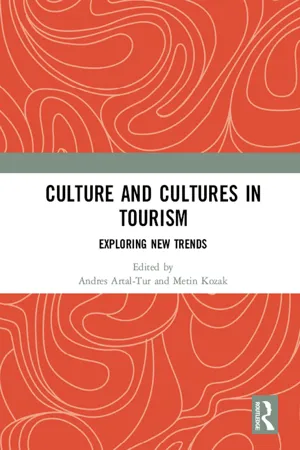The aim of this paper is to highlight the cultural aspects of a country as a Mediterranean island (North Cyprus) where tourism is the main economic sector. Cultural products are drawing significant attention as interest in experiencing and learning about different cultures has grown widespread among tourists today. The assumption is that if tourism policy makers are not clearly defining their cultural values, along with appropriate strategies to restore their authenticity, it is likely that most of the cultural uniqueness will be underutilized and eventually lost. A qualitative research strategy has been employed and an in-depth semi-structured set of interview questions were administered to the informants in numerous culturally involved institutions. The study revealed that, notwithstanding the rich cultural assets and abundance of heritage, North Cyprus has not been able to develop a clear strategy towards cultural and heritage planning for the purpose of tourists’ consumption.
Cultural tourism, as a motivational factor for international tourism, existed during the pre-industrial era, not necessarily for the masses but rather for the elite (Burton, 1995; Smith & Robinson, 2006). In fact, the ‘grand tour’ of the eighteenth century was considered a cultural and educational experience for the privileged young Englishmen as a prerequisite to start a career (www.grand-tour.org/history.htm). Nonetheless, commodification of cultural (Boissevain, 1996; Cohen, 1988) resources for the consumption of tourists en masse (i.e., mass tourism), is rather a new phenomenon that has fostered the demand for cultural tourism over the last few decades (Yang & Wall, 2009). Today, there are many institutionalized cultural products, whether provided by the public sector and/or private sector, which have been established to provide the tourists with authentic experiences (Chhabra, 2008). No doubt, ‘In recent years there have been increases in domestic and international tourism for the purpose of experiencing culture’ (Besculides, Lee &, McCormick, 2002, pp. 303–304). By definition, cultural tourism captures a range of activities/experiences that are mainly based upon combined notions of culture and heritage. In this regard, the International Commission on Monuments and Sites (ICOMOS) stated comprehensively that:
a combination of natural as well as the cultural environment which encompasses landscapes, historic places, sites and built environments, as well as bio-diversity, collections, past and continuing cultural practices, knowledge and living experiences. It records and expresses the long processes of historic development, forming the essence of diverse national, regional, indigenous and local identities. (as cited in Soper, 2007, p. 97)
The social/cultural construct of authenticity has been instrumental in the tourism sector in reviving the identities of the diaspora around the world. ‘Trip organizers utilize heritage tourism that identifies the signifiers of national collective identity, or Peoplehood, and construct an experience of authenticity that supports a newly reconstructed narrative of personal and collective identity that bridges the Diaspora and homeland identities’ (Lev Ari & Mittelberg, 2008, p. 79). Therefore, cultural tourism and its impact go beyond mere economic gain, it also becomes a mechanism against vagaries of globalization’s encroachment upon landscapes and occupants (Waters, 2001), which reinforces the ‘placelessness’ through various invisible tentacles (Richards & Wilson, 2007).
This study tries to explore the issues in relation to product development and marketing of cultural tourism, in the context of the tourism sector, where culture is a sub-category of tourism and often combined with heritage tourism (Halewood & Hannam, 2001). The study also focuses on exploring the perceptions and behavior/role of the state/institutions in commodifying the past for tourists. However, the process is not necessarily a linear one, rather it should be understood within framework of history (time) and geography (space) in addition to the context of narratives of local, regional, and national identity within a universe called ‘global village’ (McLuhan, 1962). As Best and Kellner state, ‘tourism and national identity are closely tied when nations use aspects of their unique history and cultural heritage to draw in international tourists’ (as cited in Soper, 2007, p. 97). Taking these themes, in the case of North Cyprus, the assumption is that the state’s cultural tourism policy is not re-inventing popular understandings of the Turkish Cypriot heritage. The study assumes that the preoccupation of the protagonists (i.e., players within the institutions) with the politics of ‘Cyprus solution’ on one hand, and their short sightedness in policy making endeavors on the other hand, have blurred the decisions and hampered the progress towards national identity and emerging cultural tourism.
Nonetheless, being an island state, despite its failure to gain external recognition (Lacher & Kaymak, 2005), it can be characterized as a developing economy striving for nationhood status. With tourism being its economic backbone, and considering its limited natural resources (other than climate), culture and heritage can become contributing factors of salvation for a successful political economy.
Notwithstanding the pros and cons regarding ‘cultural’ tourism, this particular form of tourism has become the center of attention by the trendsetters. Regardless, such a trend will grow and expand under different labels, including the following: ethnic, shopping, gambling, theme, hallmark, event, Olympic, craft, and overall material as well as immaterial culture. Moreover, the forces of globalization, which constitute the ‘global village’ as a ubiquitous metaphor for current ...
